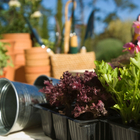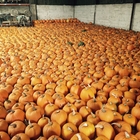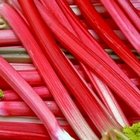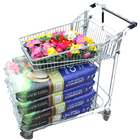Companion planting advice from Country Market's plant nursery, Hampshire
Pick up everything you need to transform your garden into a more harmonious environment, with tips and advice from our gardening gurus at our plant nursery, Hampshire.

The gardening experts from our plant nursery, Hampshire, explain the concept of companion planting
Companion planting is essentially a method utilised in both gardening and agriculture, where different crops are located together for mutual benefit or so that one plant can improve the growth of another, by using a plant with strong defences to boost the weakness found in another species of plant.
One benefit of companion planting is that certain plants deter pests away from the main crop, or attract pollinating insects, and this is a technique adopted at our plant nursery, Hampshire.
Many of the modern principles of companion planting were present many centuries ago in English cottage gardens and it was widely promoted in the 1970's as part of the organic gardening movement. Here at Country Market's plant nursery, Hampshire, we are advocates of organic gardening and therefore encourage companion planting wherever possible.
Attracting the right wildlife into your garden or vegetable plot
To encourage your garden or vegetable patch to flourish, it is helpful to attract certain insects and birds to your garden or vegetable patch. Sweet peas attract a variety of pollinating insects which help to assist runner bean flowers, and Calendula flowers are highly attractive to pollinating insects which will, in turn, pollinate courgette flowers. Bees assist in pollination and birds are predators of slugs. You can pick up everything you need to attract helpful creatures into your garden, from our plant nursery, Hampshire.
Deterring pests, naturally
Some plants and flowers produce scents or chemicals to protect themselves from pests, and these can be useful if placed next to a plant that cannot defend itself. Defend your beautiful roses from aphids by planting garlic amongst them. The smell of French marigolds is claimed to deter aphids, greenfly and whitefly from feeding on neighbouring crops, such as tomatoes, whilst also attracting nectar-feeding adult hoverflies, the larvae of which are predators of aphids so the effect is doubly beneficial.
Many herbs repel insects, so mint may deter flea beetles which ordinarily feed on cabbage, kale and cauliflower and sage wards off pests which feed on carrots or cabbages. At our plant nursery, Hampshire we have an abundance of plants and herbs which can be co-located in your garden or vegetable patch to repel unwanted insects.
Improving the soil
Visit our extensive plant nursery, Hampshire, to stock up on plants from the pea family – such as lupins, peas, beans and sweet peas – as these benefit the soil by taking nitrogen from the air and store it in their roots. Yarrow also boosts vigour in other plants and accumulates phosphorous, calcium and silica which can benefit homemade compost when plants are added to the heap and it also attracts hoverflies and ladybirds.
We hope this guide to companion planting has been helpful but for more tips and advice, please visit Country Market and speak to the experts at our plant nursery, Hampshire.
 Valentine's Day at our farm shop
Valentine's Day at our farm shop Johnsons Fish at Country Market
Johnsons Fish at Country Market Make your garden your New Year's resolution – tips from the experts at our garden centre in Hampshire.
Make your garden your New Year's resolution – tips from the experts at our garden centre in Hampshire. Award winning fresh bronze turkeys from Owtons
Award winning fresh bronze turkeys from Owtons Christmas & New Year Opening Hours at Country Market 2025
Christmas & New Year Opening Hours at Country Market 2025 Home grown Pumpkins - good food for Autumn
Home grown Pumpkins - good food for Autumn Rhubarb – home grown on our family farm
Rhubarb – home grown on our family farm Shop online with Country Market
Shop online with Country Market Welcome back to Country Market
Welcome back to Country Market